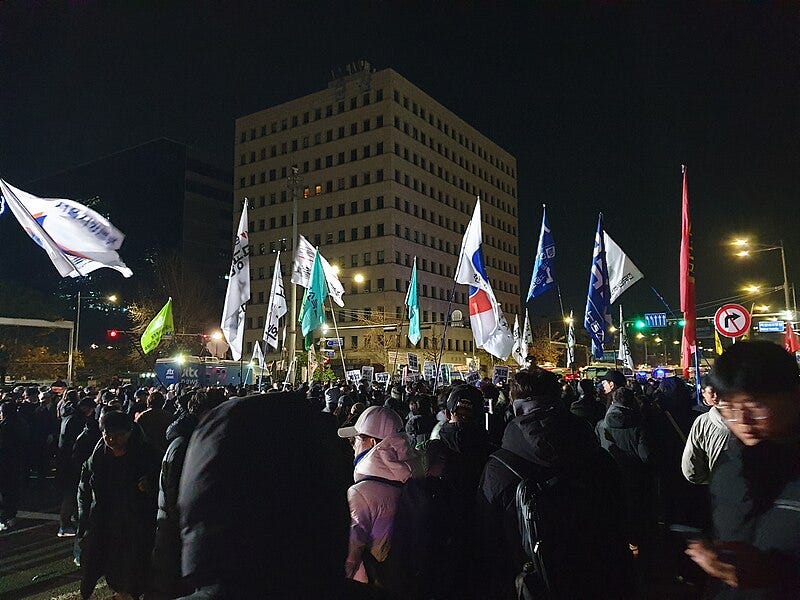Dictator For a Day
Autocracy is not in lived memory for (most) Americans. Can we avoid it?

Donald Trump has vowed to be a dictator on his first day back in office. (His campaign has said the comment was made to trigger liberals.) While his taking office is some six weeks away, we now have some evidence of how other countries have acted when their elected leaders have tried to act like a dictator for a day -- or longer.
On December 3, at 10:27 p.m., South Korean President Yoon Suk Yeol declared martial law in a televised address. Yoon is an avowed "anti-feminist" who won a bitterly contested election in 2022 with the support of young unmarried men and has faced a number of corruption and tax scandals. (Sound familiar?) However, his power grab quickly collapsed. Lawmakers -- including those of his own party -- voted to overturn the decree in under three hours; protesters gathered, and six hours later, martial law was over. On December 7, Yoon survived impeachment by Korean lawmakers.
In Georgia, protesters have turned out for 10 consecutive nights following Prime Minister Irakli Kobakhidze's November 28 announcement to suspend EU accession talks through 2028. The decision flies in the face of the wishes of some 80 percent of Georgians who want to join the EU; in the run-up to October parliamentary elections, his party campaigned -- and some of his supporters voted for -- joining the EU "with dignity." Kobakhidze's party, Georgian Dream, held onto power in these October 26 elections that neither the U.S. nor the EU have said were free nor fair, and where independent observers saw widespread fraud and violence. The protests have been met with growing brutality from Georgian security forces, who have beaten and detained people and used tear gas and water cannons. Nevertheless, the protests continue.
Last month, U.S. voters rewarded Donald Trump with another term even after he tried to overturn the results of the free and fair election by encouraging a violent mob to storm the U.S. Capitol on January 6, 2021 and had announced plans to use the U.S. military and Justice Department against perceived enemies. Exit polls from the Associated Press and Fox News indicate that many Trump voters voted for him for economic reasons despite their concerns about the future of U.S. democracy; the Fox poll showed that out of the 10 percent of voters who described themselves as "somewhat concerned" with Trump having "unchecked power," 51 percent voted for him anyway.
In these cases, leaders won elections with popular support. Yoon won in a close 2022 election. The Georgian Dream certainly would have gotten the most votes of any party -- and possibly a majority -- without manipulating the election. Trump narrowly won the popular vote and swept all of the swing states.
Yoon and the Georgian Dream overreached, and, given how extreme his cabinet picks have been, Trump's overreach seems inevitable. His strategy behind the appointments seems to be to try to stretch the bounds of acceptability to see what U.S. political institutions will tolerate. No longer does he have to worry about winning reelection or having top officials (the so-called adults in the room) thwart his most extreme actions. (While opposition from Senate Republicans sunk the nomination of Matt Gaetz as attorney general, it remains to be seen whether Senate Republicans will actually block other nominees who share Trump's agenda of "retribution" against perceived enemies, like Kash Patel to the F.B.I.)
The question remains: when Trump acts on his authoritarian plans, will Americans go into the streets like Koreans and Georgians have?


